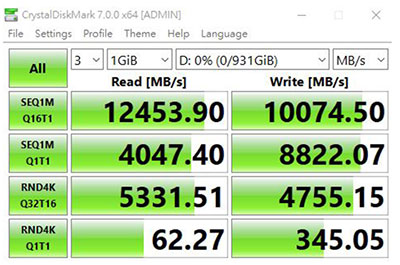Gigabyte Announces Aorus PCIe 5.0 SSD Up To 12.4 GBps
Gigabyte demonstrates Aorus Gen5 10000 SSD.
Gigabyte on Friday announced one of the industry's first solid state drive with the PCIe 5.0 x4 interface aimed at high-end client PCs. The Aorus Gen5 10000 drive offers about 75% higher sequential read performance than even the most expensive PCIe Gen4 drives and will be available in the coming weeks or months. Meanwhile, since it is based on an off-the-shelf Phison design, it will not be the only SSD with a PCIe Gen5 interface. However, given the performance specifications offered by the Aorus Gen5 10000 SSD, we have no doubts that it will be one of the best SSDs available this fall.
Gigabyte says that its Aorus Gen5 10000 SSD offers a maximum sequential read speed of up to 12,454 MB/s and a top sequential write speed of up to 10,078 MB/s (based on CrystalDiskMark), which is 75% and 48% faster when compared to high-end drives with a PCIe 4.0 x4 interface. When it comes to random performance, the Aorus Gen5 10000provides about 1.3 million 4K read IOPS (Q32T16), and up to 1.16 million 4K read IOPS (Q32T16), which is significantly higher when compared to the majority of client PCIe 4.0 x4 drives.
Gigabyte's Aorus Gen5 10000 SSD is based around Phison's PS5026-E26 controller (Arm Cortex-R5 cores accompanied by special-purpose CoXProcessor 2.0 accelerators, 8 NAND channels) as well as recently announced ~200-layer 3D TLC NAND memory with a 2400 MT/s (though Gigabyte does not specify whether we are dealing with memory from Micronor SK Hynix).
The manufacturer intends to offer its new high-performance M.2-2280 drive in 1TB, 2TB, and 4TB configurations. In addition, the company will ship its Aorus Gen5 10000 SSD with an easily removable full-covered copper heatsink so users can choose whether to use the drive with it or instead go with an M.2 cooling solution featured by their motherboards.
Gigabyte's Aorus Gen5 10000 SSD and Corsair's MP700 product are among the first solid-state drives to use Phison's PS5026-E26 platform, the first generation offering from the controller developer. Because a PCIe 5.0 x4 interface offers raw bandwidth of up to 15.8 GB/s in each direction, we expect eventual PCIe Gen5 implementations from Phison to offer even more performance. Still, for now, the E26 is the only client platform for PCIe Gen5 SSDs.
Gigabyte does not reveal pricing or the exact launch window for its Aorus Gen5 10000 SSDs. Still, we could speculate that the company will charge a premium for the extreme performance offered by these drives and will try to launch them when new PCIe 5.0-supporting platforms from AMD and Intel are available.
Get Tom's Hardware's best news and in-depth reviews, straight to your inbox.

Anton Shilov is a contributing writer at Tom’s Hardware. Over the past couple of decades, he has covered everything from CPUs and GPUs to supercomputers and from modern process technologies and latest fab tools to high-tech industry trends.
-
-Fran- Is this the new "Hertz" race? LOLReply
Anyway, the randoms do look good here. I base this on my favorite drive of this gen, the Crucial P5 Plus: https://www.guru3d.com/articles-pages/crucial-p5-plus-pcie-4-m-2-nvme-review,15.html
That being said, the Samsung 980 Pro looks really close in Randoms, which is the metric that matters here, so I can't really get that excited about the PCIe5 speeds they can reach without looking at randoms. This is like high FPS, but crappy 1% lows.
Interesting still. I wonder how the Samsung 980 Pro successor will compare.
Regards. -
BlueOnes This is great that the slow hard drive problems and game loading screens were finally solved with SSDs. But its getting silly now. Once you're past PCIe 3.0 3500, you arent going to notice it. Your game might load 1 10th of a second faster. In real world situations, you wont notice or feel a difference. Put 20 PCs side by side, 19 have PCIe 3.0 3500, one has PCIe 5.0 12,400. Have 1000 random people try all 20 machines. I betcha not a one of em is gonna be like "Oh ya, its this one right here. This is the one with the PCIe 5.0 12,400. I can tell by how much faster it is compared to the others". No, no one is going to notice. Its getting ridiculous. Speed should no longer be the focus. High capacity storage should beReply
